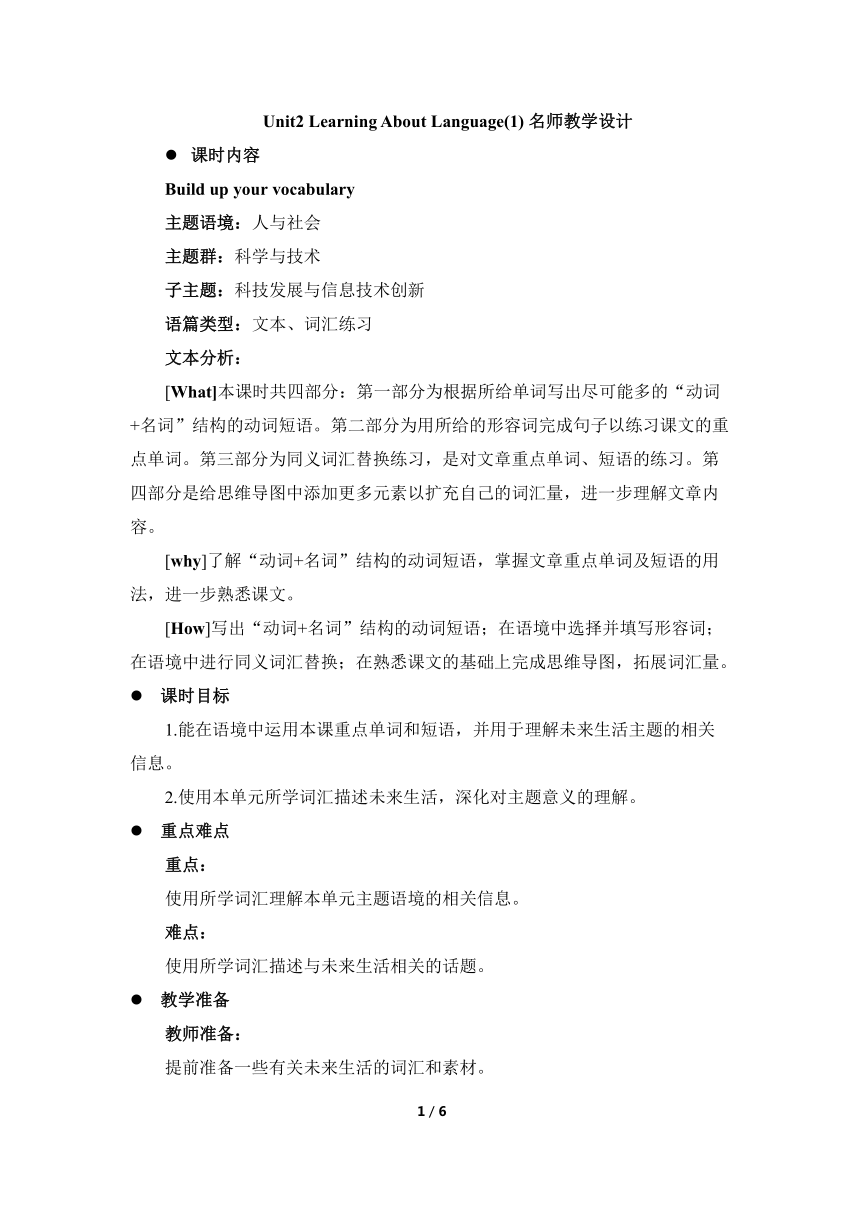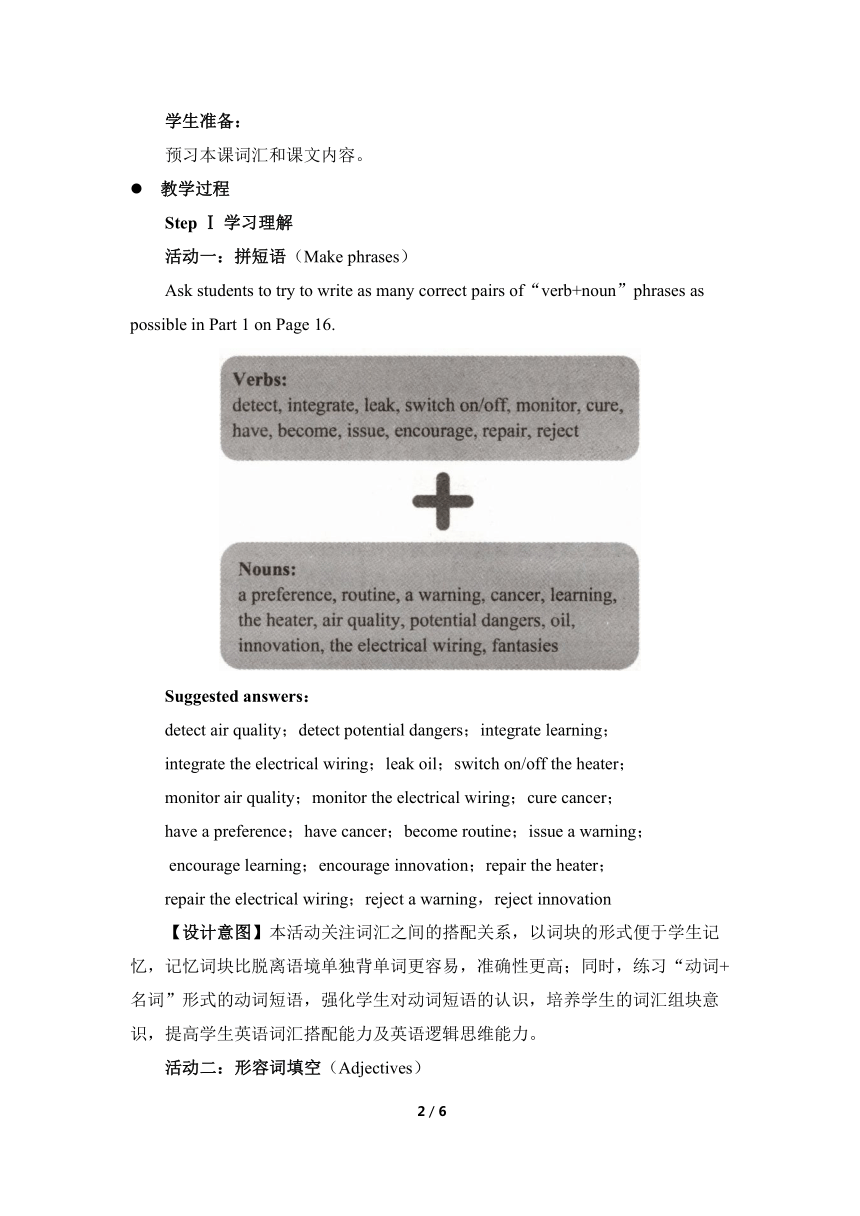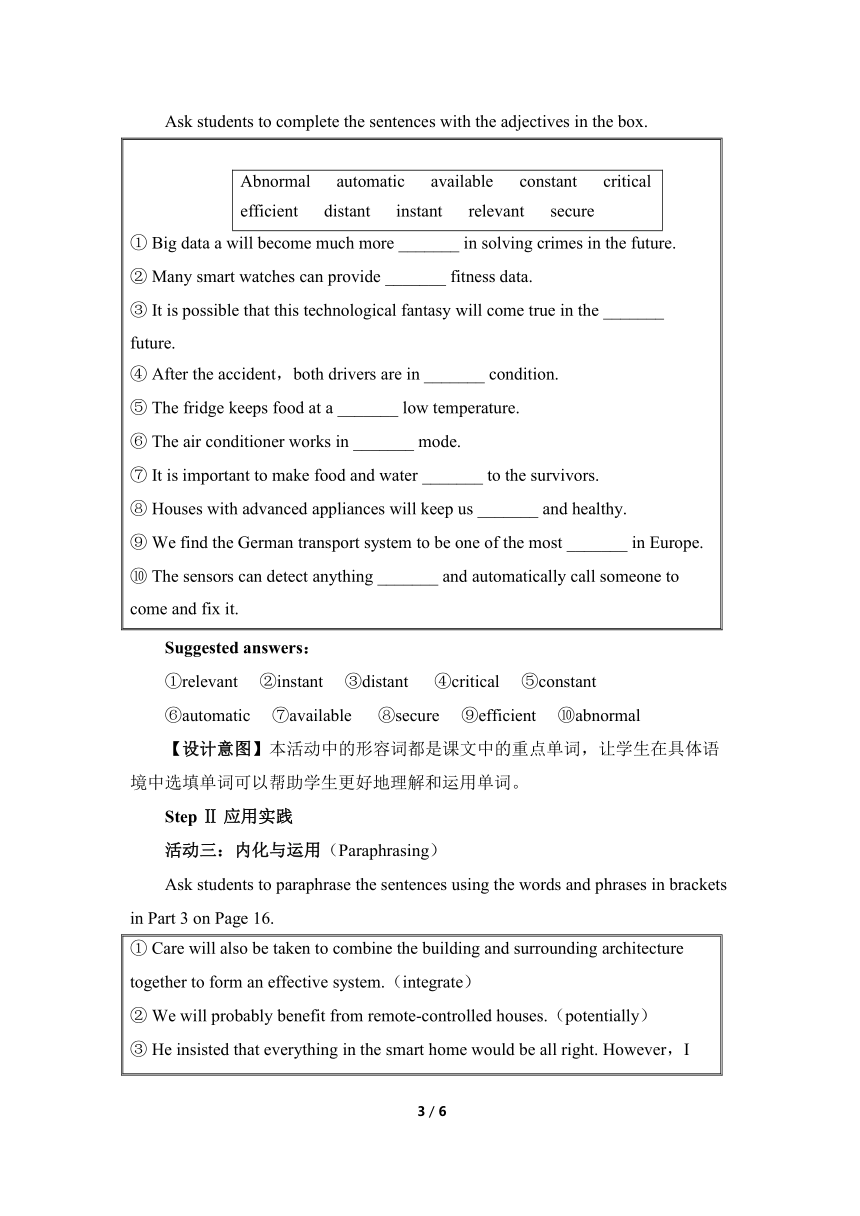人教版(2019)选择性必修第一册 Unit2 Looking into the Future Learning About Language(1) 名师教学设计
文档属性
| 名称 | 人教版(2019)选择性必修第一册 Unit2 Looking into the Future Learning About Language(1) 名师教学设计 |  | |
| 格式 | docx | ||
| 文件大小 | 1.2MB | ||
| 资源类型 | 教案 | ||
| 版本资源 | 人教版(2019) | ||
| 科目 | 英语 | ||
| 更新时间 | 2023-03-11 12:11:36 | ||
图片预览



文档简介
Unit2 Learning About Language(1) 名师教学设计
课时内容
Build up your vocabulary
主题语境:人与社会
主题群:科学与技术
子主题:科技发展与信息技术创新
语篇类型:文本、词汇练习
文本分析:
[What]本课时共四部分:第一部分为根据所给单词写出尽可能多的“动词+名词”结构的动词短语。第二部分为用所给的形容词完成句子以练习课文的重点单词。第三部分为同义词汇替换练习,是对文章重点单词、短语的练习。第四部分是给思维导图中添加更多元素以扩充自己的词汇量,进一步理解文章内容。
[why]了解“动词+名词”结构的动词短语,掌握文章重点单词及短语的用法,进一步熟悉课文。
[How]写出“动词+名词”结构的动词短语;在语境中选择并填写形容词;在语境中进行同义词汇替换;在熟悉课文的基础上完成思维导图,拓展词汇量。
课时目标
1.能在语境中运用本课重点单词和短语,并用于理解未来生活主题的相关信息。
2.使用本单元所学词汇描述未来生活,深化对主题意义的理解。
重点难点
重点:
使用所学词汇理解本单元主题语境的相关信息。
难点:
使用所学词汇描述与未来生活相关的话题。
教学准备
教师准备:
提前准备一些有关未来生活的词汇和素材。
学生准备:
预习本课词汇和课文内容。
教学过程
Step Ⅰ 学习理解
活动一:拼短语(Make phrases)
Ask students to try to write as many correct pairs of“verb+noun”phrases as possible in Part 1 on Page 16.
Suggested answers:
detect air quality;detect potential dangers;integrate learning;
integrate the electrical wiring;leak oil;switch on/off the heater;
monitor air quality;monitor the electrical wiring;cure cancer;
have a preference;have cancer;become routine;issue a warning;
encourage learning;encourage innovation;repair the heater;
repair the electrical wiring;reject a warning,reject innovation
【设计意图】本活动关注词汇之间的搭配关系,以词块的形式便于学生记忆,记忆词块比脱离语境单独背单词更容易,准确性更高;同时,练习“动词+名词”形式的动词短语,强化学生对动词短语的认识,培养学生的词汇组块意识,提高学生英语词汇搭配能力及英语逻辑思维能力。
活动二:形容词填空(Adjectives)
Ask students to complete the sentences with the adjectives in the box.
Abnormal automatic available constant critical efficient distant instant relevant secure
① Big data a will become much more _______ in solving crimes in the future. ② Many smart watches can provide _______ fitness data. ③ It is possible that this technological fantasy will come true in the _______ future. ④ After the accident,both drivers are in _______ condition. ⑤ The fridge keeps food at a _______ low temperature. ⑥ The air conditioner works in _______ mode. ⑦ It is important to make food and water _______ to the survivors. ⑧ Houses with advanced appliances will keep us _______ and healthy. ⑨ We find the German transport system to be one of the most _______ in Europe. ⑩ The sensors can detect anything _______ and automatically call someone to come and fix it.
Suggested answers:
①relevant ②instant ③distant ④critical ⑤constant
⑥automatic ⑦available ⑧secure ⑨efficient ⑩abnormal
【设计意图】本活动中的形容词都是课文中的重点单词,让学生在具体语境中选填单词可以帮助学生更好地理解和运用单词。
Step Ⅱ 应用实践
活动三:内化与运用(Paraphrasing)
Ask students to paraphrase the sentences using the words and phrases in brackets in Part 3 on Page 16.
① Care will also be taken to combine the building and surrounding architecture together to form an effective system.(integrate) ② We will probably benefit from remote-controlled houses.(potentially) ③ He insisted that everything in the smart home would be all right. However,I could not help but feel anxious.(nevertheless) ④ It is a good habit to make certain that you know what is happening with your blood pressure.(keep track of) ⑤ The monitoring system sends out warnings as soon as the car begins to leak oil.(the instant)
Suggested answers:
① Care will also be taken to integrate the building and surrounding architecture together to form an effective system.
② We will potentially benefit from remote-controlled houses.
③ He insisted that everything in the smart home would be all right. Nevertheless,I could not help but feel anxious.
④ It is a good habit to make certain that you keep track of your blood pressure.
⑤ The monitoring system sends out warnings the instant the car begins to leak oil.
【设计意图】在高考英语试题中,阅读分数占据了较大比重,而阅读题中的一个重点就是用词多样性,即同义词替换,所以在日常的英语学习中需要注重积累同义词,只有这样才能够更加准确地理解文章的真正含义。
Step Ⅲ 迁移创新
活动四:推理与论证(Build up vocabulary)
1.Ask students to work in pairs and add more elements in the mind map to build up their vocabulary.
2.Check their answers. Teacher can collect as many answers as possible and write the answers on the blackboard.
Suggested answers:
·Houses:integrated sensors;remote control;energy-efficient;voice commands;climate control;home automation;remote monitoring
·Transport:driverless cars;high-speed rail;mag lev trains;hybrid cars;electric cars;biofuel;smart roads
·Health:health monitoring;nanotechnology;robotics;mobile apps;wearable monitoring devices;3D printing(e.g.,for organs or tissues);virtual reality(e.g.,for remote surgery or diagnoses);AI(e.g.,for medical diagnoses)
·Security:machines to detect disasters;CCTV cameras;data encryption;monitoring drones;biometrics
·Work:telecommuting;automation;cloud technology;collaboration tools;virtual offices;Al;gig economy
·Entertainment:CGI (computer-generated imagery);virtual reality;home theatres;interactive TV;immersive media;augmented reality
【设计意图】学生使用多元思维和本单元所学词汇,通过结对活动,讨论和交流人们将来的生活方式,增加了活动本身的趣味性,提高了学习效率。
板书设计
Unit 2 Looking into the Future Period Ⅱ Learning About Language(1) Ⅰ.学习理解 活动一:拼短语(Make phrases) 活动二:形容词填空(Adjectives) Ⅱ.应用实践 活动三:内化与运用(Paraphrasing) Ⅲ.迁移创新 活动四:推理与论证(Build up vocabulary)
2 / 2
课时内容
Build up your vocabulary
主题语境:人与社会
主题群:科学与技术
子主题:科技发展与信息技术创新
语篇类型:文本、词汇练习
文本分析:
[What]本课时共四部分:第一部分为根据所给单词写出尽可能多的“动词+名词”结构的动词短语。第二部分为用所给的形容词完成句子以练习课文的重点单词。第三部分为同义词汇替换练习,是对文章重点单词、短语的练习。第四部分是给思维导图中添加更多元素以扩充自己的词汇量,进一步理解文章内容。
[why]了解“动词+名词”结构的动词短语,掌握文章重点单词及短语的用法,进一步熟悉课文。
[How]写出“动词+名词”结构的动词短语;在语境中选择并填写形容词;在语境中进行同义词汇替换;在熟悉课文的基础上完成思维导图,拓展词汇量。
课时目标
1.能在语境中运用本课重点单词和短语,并用于理解未来生活主题的相关信息。
2.使用本单元所学词汇描述未来生活,深化对主题意义的理解。
重点难点
重点:
使用所学词汇理解本单元主题语境的相关信息。
难点:
使用所学词汇描述与未来生活相关的话题。
教学准备
教师准备:
提前准备一些有关未来生活的词汇和素材。
学生准备:
预习本课词汇和课文内容。
教学过程
Step Ⅰ 学习理解
活动一:拼短语(Make phrases)
Ask students to try to write as many correct pairs of“verb+noun”phrases as possible in Part 1 on Page 16.
Suggested answers:
detect air quality;detect potential dangers;integrate learning;
integrate the electrical wiring;leak oil;switch on/off the heater;
monitor air quality;monitor the electrical wiring;cure cancer;
have a preference;have cancer;become routine;issue a warning;
encourage learning;encourage innovation;repair the heater;
repair the electrical wiring;reject a warning,reject innovation
【设计意图】本活动关注词汇之间的搭配关系,以词块的形式便于学生记忆,记忆词块比脱离语境单独背单词更容易,准确性更高;同时,练习“动词+名词”形式的动词短语,强化学生对动词短语的认识,培养学生的词汇组块意识,提高学生英语词汇搭配能力及英语逻辑思维能力。
活动二:形容词填空(Adjectives)
Ask students to complete the sentences with the adjectives in the box.
Abnormal automatic available constant critical efficient distant instant relevant secure
① Big data a will become much more _______ in solving crimes in the future. ② Many smart watches can provide _______ fitness data. ③ It is possible that this technological fantasy will come true in the _______ future. ④ After the accident,both drivers are in _______ condition. ⑤ The fridge keeps food at a _______ low temperature. ⑥ The air conditioner works in _______ mode. ⑦ It is important to make food and water _______ to the survivors. ⑧ Houses with advanced appliances will keep us _______ and healthy. ⑨ We find the German transport system to be one of the most _______ in Europe. ⑩ The sensors can detect anything _______ and automatically call someone to come and fix it.
Suggested answers:
①relevant ②instant ③distant ④critical ⑤constant
⑥automatic ⑦available ⑧secure ⑨efficient ⑩abnormal
【设计意图】本活动中的形容词都是课文中的重点单词,让学生在具体语境中选填单词可以帮助学生更好地理解和运用单词。
Step Ⅱ 应用实践
活动三:内化与运用(Paraphrasing)
Ask students to paraphrase the sentences using the words and phrases in brackets in Part 3 on Page 16.
① Care will also be taken to combine the building and surrounding architecture together to form an effective system.(integrate) ② We will probably benefit from remote-controlled houses.(potentially) ③ He insisted that everything in the smart home would be all right. However,I could not help but feel anxious.(nevertheless) ④ It is a good habit to make certain that you know what is happening with your blood pressure.(keep track of) ⑤ The monitoring system sends out warnings as soon as the car begins to leak oil.(the instant)
Suggested answers:
① Care will also be taken to integrate the building and surrounding architecture together to form an effective system.
② We will potentially benefit from remote-controlled houses.
③ He insisted that everything in the smart home would be all right. Nevertheless,I could not help but feel anxious.
④ It is a good habit to make certain that you keep track of your blood pressure.
⑤ The monitoring system sends out warnings the instant the car begins to leak oil.
【设计意图】在高考英语试题中,阅读分数占据了较大比重,而阅读题中的一个重点就是用词多样性,即同义词替换,所以在日常的英语学习中需要注重积累同义词,只有这样才能够更加准确地理解文章的真正含义。
Step Ⅲ 迁移创新
活动四:推理与论证(Build up vocabulary)
1.Ask students to work in pairs and add more elements in the mind map to build up their vocabulary.
2.Check their answers. Teacher can collect as many answers as possible and write the answers on the blackboard.
Suggested answers:
·Houses:integrated sensors;remote control;energy-efficient;voice commands;climate control;home automation;remote monitoring
·Transport:driverless cars;high-speed rail;mag lev trains;hybrid cars;electric cars;biofuel;smart roads
·Health:health monitoring;nanotechnology;robotics;mobile apps;wearable monitoring devices;3D printing(e.g.,for organs or tissues);virtual reality(e.g.,for remote surgery or diagnoses);AI(e.g.,for medical diagnoses)
·Security:machines to detect disasters;CCTV cameras;data encryption;monitoring drones;biometrics
·Work:telecommuting;automation;cloud technology;collaboration tools;virtual offices;Al;gig economy
·Entertainment:CGI (computer-generated imagery);virtual reality;home theatres;interactive TV;immersive media;augmented reality
【设计意图】学生使用多元思维和本单元所学词汇,通过结对活动,讨论和交流人们将来的生活方式,增加了活动本身的趣味性,提高了学习效率。
板书设计
Unit 2 Looking into the Future Period Ⅱ Learning About Language(1) Ⅰ.学习理解 活动一:拼短语(Make phrases) 活动二:形容词填空(Adjectives) Ⅱ.应用实践 活动三:内化与运用(Paraphrasing) Ⅲ.迁移创新 活动四:推理与论证(Build up vocabulary)
2 / 2
